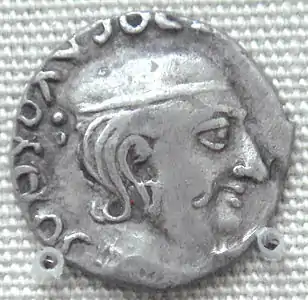| Vashishtiputra Satakarni | |
|---|---|
  Vashishtiputra Sri Satakarni, with coin legend in the Brahmi script. | |
| Satavahana King | |
| Reign | 2nd century CE |
| Successor | Yajna Sri Satakarni |
| Dynasty | Satavahana |
| Religion | Vedic religion |
Vashishtiputra Sātakarni (Brahmi: 𑀯𑀸𑀲𑀺𑀣𑀺𑀧𑀼𑀢 𑀲𑀸𑀢𑀓𑀁𑀁𑀡𑀺, Vāsiṭhiputa Sātakaṃṇi) was a Satavahana king, who ruled the Deccan region in India, during the 2nd century CE. He was the brother of Yajna Sri Satakarni, his regnal successor and Vasishthiputra Pulumavi, his regnal predecessor. His reign is dated 158-165 CE.[1]
| Satavahana kings 100 BCE–2nd c. CE | ||||||||||||||||||||||
|---|---|---|---|---|---|---|---|---|---|---|---|---|---|---|---|---|---|---|---|---|---|---|
|
||||||||||||||||||||||
Vashishtiputra Sātakarni was in great conflict with the Scythian Western Kshatrapas in the West, but he eventually married the daughter of Rudradaman I of the Western Kshatrapas dynasty, in order to forge an alliance.[2] The inscription relating the marriage between Rudradaman I's daughter and Vashishtiputra Satakarni appears in a cave at Kanheri:[2]
"Of the queen ... of the illustrious Vashishtiputra Satakarni, descended from the race of Karddamaka kings, (and) daughter of the Mahakshatrapa Ru(dra)....... .........of the confidential minister Sateraka, a water-cistern, the meritorious gift.
— Kanheri inscription of Rudradaman I's daughter".[3]
Later, however, Vashishtiputra Sātakarni was defeated by his father-in-law in battle, with serious effect on Sātavāhana power and prestige:
"Rudradaman (...) who obtained good report because he, in spite of having twice in fair fight completely defeated Satakarni, the lord of Dakshinapatha, on account of the nearness of their connection did not destroy him."
Gallery
._Vasisthiputra_Satakarni.jpg.webp) Coin of Vasisthiputra Satakarni
Coin of Vasisthiputra Satakarni Coin of Rudradaman I, whose daughter was married to Vashishtiputra Satakarni to form an alliance.
Coin of Rudradaman I, whose daughter was married to Vashishtiputra Satakarni to form an alliance.
Notes
- ↑ Rajesh Kumar Singh (2013). Ajanta Paintings: 86 Panels of Jatakas and Other Themes. Hari Sena. pp. 15–16. ISBN 9788192510750.
- 1 2 Alcock, Susan E.; Alcock, John H. D'Arms Collegiate Professor of Classical Archaeology and Classics and Arthur F. Thurnau Professor Susan E.; D'Altroy, Terence N.; Morrison, Kathleen D.; Sinopoli, Carla M. (2001). Empires: Perspectives from Archaeology and History. Cambridge University Press. p. 175. ISBN 9780521770200.
- ↑ Burgess, James; Bühler, Georg (1883). Report on the Elura cave temples and the Brahmanical and Jaina caves in western India; completing the results of the fifth, sixth, and seventh seasons' operations of the Archaeological survey, 1877-78, 1878-79, 1879-80. Supplementary to the volume on "The cave temples of India.". London, Trübner & Co. p. 78.
- ↑ "Source". Archived from the original on 23 February 2009. Retrieved 28 December 2008.
References
- K.A. Nilakanta Sastri, A History of South India (Madras, 1976).
- Mahadevan, Iravatham (2003), Early Tamil Epigraphy from the Earliest Times to the Sixth Century A.D., Harvard Oriental Series vol. 62, Cambridge, Mass.: Harvard University Press, ISBN 0-674-01227-5
